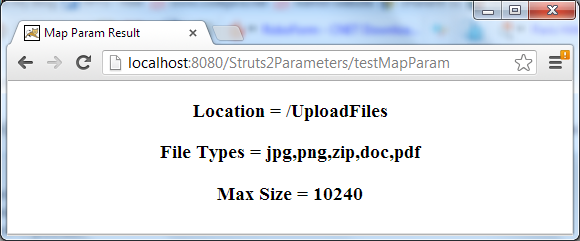How to pass parameters from struts.xml to Struts action class
- Details
- Written by Nam Ha Minh
- Last Updated on 31 July 2019 | Print Email
In this Struts tutorial, I will share with you how to read values of parameters configured in the Struts configuration file from within a Struts action class.
In Struts, the staticParams interceptor enables us configuring parameters for an action class in struts.xml configuration file, for example:
<action name="actionName" class="net.codejava.struts.MyAction"> <param name="param1">Value 1</param> <param name="param2">Value 2</param> <!-- results names go here... --> </action>
As we can see, each <param> element specifies key and value for a parameter - very straightforward. In the action class, there are two ways for reading these parameters: using JavaBean-style methods and using a Map object named params.
1. Reading parameters using JavaBean-style methods:
In this method, we have to declare properties whose names equal to key names of the parameters in struts.xml file. Suppose we specify parameters for an action as follows:
<action name="testMethodParam" class="net.codejava.struts.MethodParamAction"> <param name="location">/UploadFiles</param> <result name="success">/MethodParamResult.jsp</result> </action>
Then write the action class like this:
package net.codejava.struts;
import com.opensymphony.xwork2.ActionSupport;
public class MethodParamAction extends ActionSupport {
private String location;
public String getLocation() {
return location;
}
public void setLocation(String location) {
this.location = location;
}
public String execute() {
System.out.println("location = " + location);
return SUCCESS;
}
}And here is the result JSP page:
<%@ page language="java" contentType="text/html; charset=ISO-8859-1"
pageEncoding="ISO-8859-1"%>
<!DOCTYPE html PUBLIC "-//W3C//DTD HTML 4.01 Transitional//EN"
"http://www.w3.org/TR/html4/loose.dtd">
<html>
<head>
<meta http-equiv="Content-Type" content="text/html; charset=ISO-8859-1">
<title>Result</title>
</head>
<body>
<center>
<h3>Upload location: ${location}</h3>
</center>
</body>
</html>Output when running: http://localhost:8080/Struts2Parameters/testMethodParam

This method is suitable when we have just a few parameters for the action.
2. Reading parameters using a Map object
In this method, we have to do the following:
- Declare a property named params of type Map<String, String> - this map will hold all the parameters passed to the action class from the struts.xml file.
- Make the action class implementing the com.opensymphony.xwork2.config.entities.Parameterizable interface and implement its methods: setParams(), getParams() and addParam().
Let’s see an example. Suppose we have an action declared in struts.xml file as follows:
<action name="testMapParam" class="net.codejava.struts.MapParamAction"> <param name="location">/UploadFiles</param> <param name="fileTypes">jpg,png,zip,doc,pdf</param> <param name="maxSize">10240</param> <result name="success">/MapParamResult.jsp</result> </action>
It’s easy to spot the three parameters are: location, fileTypes and maxSize. Now we implement the action class as follows:
package net.codejava.struts;
import java.util.HashMap;
import java.util.Map;
import com.opensymphony.xwork2.ActionSupport;
import com.opensymphony.xwork2.config.entities.Parameterizable;
public class MapParamAction extends ActionSupport implements Parameterizable {
private Map<String, String> params = new HashMap<String, String>();
@Override
public void addParam(String key, String value) {
this.params.put(key, value);
}
@Override
public Map<String, String> getParams() {
return this.params;
}
@Override
public void setParams(Map<String, String> params) {
this.params = params;
}
public String execute() {
System.out.println("param1 = " + this.params.get("param1"));
System.out.println("param2 = " + this.params.get("param2"));
System.out.println("param3 = " + this.params.get("param3"));
return SUCCESS;
}
}As we can see, reading a parameter’s value is as simple as reading a map element:
String value = params.get("key");Here is the result JSP page:
<%@ page language="java" contentType="text/html; charset=ISO-8859-1"
pageEncoding="ISO-8859-1"%>
<!DOCTYPE html PUBLIC "-//W3C//DTD HTML 4.01 Transitional//EN" "http://www.w3.org/TR/html4/loose.dtd">
<html>
<head>
<meta http-equiv="Content-Type" content="text/html; charset=ISO-8859-1">
<title>Map Param Result</title>
</head>
<body>
<center>
<h3>Location = ${params.location}</h3>
<h3>File Types = ${params.fileTypes}</h3>
<h3>Max Size = ${params.maxSize}</h3>
</center>
</body>
</html>Output when running: http://localhost:8080/Struts2Parameters/testMapParam

This method looks a bit more complex then the JavaBean-style one, however it would be useful in case we have many parameters, as reading parameters from a map is easier than having many getter and setter methods.
NOTE: The staticParams interceptor is already included in the Strut’s default stack, so if our package extends from the struts-default package, there is no need to include this interceptor explicitly.
Related Struts Tutorials:
- How to configure Struts framework in web.xml
- Reading parameters from web.xml in Struts action class
- Splitting (modularizing) Struts configuration file
- How to access HttpServletRequest and HttpServletResponse within Struts2 action class
Other Struts Tutorials:
- Introduction to Struts 2 framework
- Struts beginner tutorial (Eclipse + Tomcat + XML)
- Struts Beginner Tutorial with Annotations
- Struts beginner tutorial with Convention Plugin (zero-configuration)
- How to handle exceptions in Struts
- Send e-mail with attachments in Struts
- Struts File Upload Tutorial
- Struts - Spring - Hibernate Integration Tutorial
About the Author:
 Nam Ha Minh is certified Java programmer (SCJP and SCWCD). He began programming with Java back in the days of Java 1.4 and has been passionate about it ever since. You can connect with him on Facebook and watch his Java videos on YouTube.
Nam Ha Minh is certified Java programmer (SCJP and SCWCD). He began programming with Java back in the days of Java 1.4 and has been passionate about it ever since. You can connect with him on Facebook and watch his Java videos on YouTube.